
How to Increase Domain Authority [And Reach #1 on Google]
Generating organic traffic and improving your spot in Google search results is a key part of online marketing, and working on increasing your domain authority (DA) is a good place to start.
Research shows that websites with higher DA or domain rating (DR), as assessed by Ahrefs, typically achieve better rankings on Google's first page.
While domain authority doesn’t directly impact your ranking, it does indicate how relevant, authoritative, and credible your website is. These are three factors that Google considers when ranking your site.
In this article, we’ll discuss:
➡️ What domain authority is and why it’s important.
➡️ Why you should increase domain authority for your website.
➡️ How domain authority works and how it is calculated.
➡️ Some proven strategies for increasing your website’s domain authority.
➡️ How you can improve your search engine rankings on Google.
What Is Domain Authority (DA)?
Domain authority refers to a website metric created by the search engine optimization (SEO) tool Moz. This metric indicates how authoritative a website is.
Moz does this by analyzing the site’s backlink profile and assigning it a DA score. Domain authority scores range from zero to 100, with higher scores representing more authoritative websites.
One of the key metrics they use to calculate your DA is your backlink profile. This is a collection of links that point to your website from other websites.
Backlinks are considered a reliable measure of a site’s authority. In theory, this is because reputable websites will only link out when the content is worth linking to.
Technically, if a site has a lot of high-quality backlinks, it means that many different people have vouched that it contains high-quality content.
Having quality backlinks is a vote of confidence for your website and indicates to Google that it’s worth ranking.
Predicting How Likely a Website Is to Rank on Google
While domain authority doesn’t determine how well you will rank on Google, it can be useful when trying to outrank direct competitors.
You can gauge whether you'll be able to rank for a term by comparing your domain authority with that of top websites in the search engine results pages (SERPs).
If your site has a similar or higher domain authority, you have a good chance of ranking alongside well-optimized pages for that keyword.
If you're not ranking for a term despite optimizing your keywords, you can also optimize your website structure and add rich media to help increase your domain authority and improve your SEO performance.
Moz isn’t the only platform with an algorithm that provides a score based on backlinks. The Ahrefs domain rating (DR) score is a popular alternative for assessing a website’s domain authority.
Like DA, DR also considers a website’s backlink profile and creates a score that estimates how authoritative a website is out of 100.
There are some differences in how the two scores are calculated, which we explore later in this article.
Why is it Important to Increase Domain Authority?
In many competitive industries, Google will only display results from reputable sites with good domain authority. In our opinion, a strong DA is anything above 50. If your website does not have strong domain authority, you may struggle to rank on Google.
Increasing domain authority can help you overcome this barrier and rank higher.
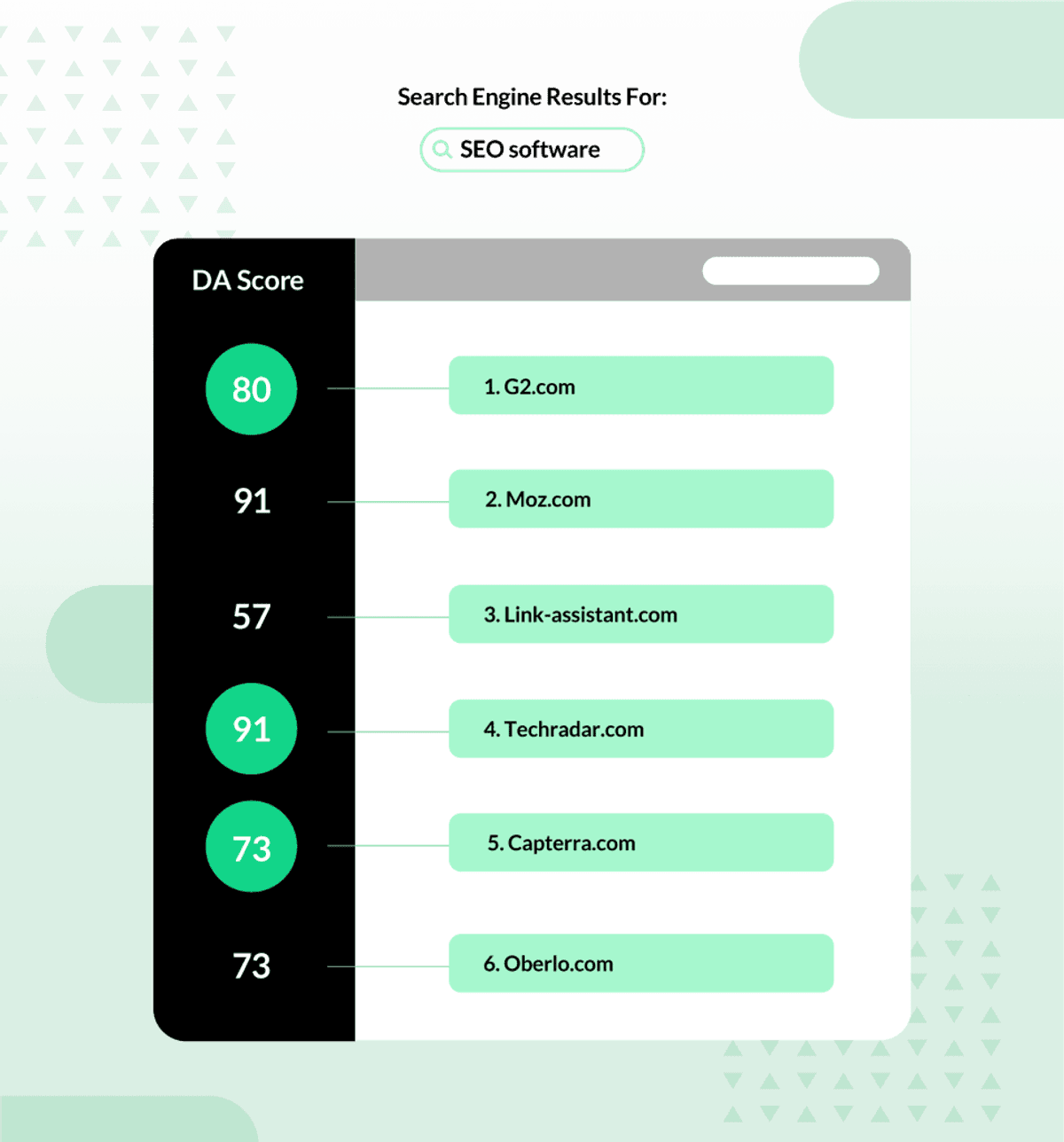
It’s important to remember that the Google Search algorithm doesn’t directly consider domain authority when ranking websites.
This is because calculating domain authority is a subjective process, and this rating is assigned by a third-party company.
🤔 Why Is DA Important, Then?
Domain authority plays an important part in predicting how well your website will rank in search engine results.
This is because the same factors that increase domain authority are used by Google to rank websites.
These factors include:
The number of domains that link to your site.
The number of sites that link to those domains.
The authority of the domains that point to your site.
In this article, we dive into domain authority and similar metrics. We also highlight some of the strategies we use at LinkBuilder to build domain authority for our clients’ websites.
Why Should You Care about Increasing Your Domain Authority?
As we’ve mentioned, domain authority isn’t an official ranking factor. If this is the case, why should you bother trying to increase your website’s authority score?
The answer is that increasing domain metric scores is typically a sign that you are building your website the right way.
Domain authority is primarily calculated based on the number of links to your site. If people are linking to you, it usually means that they like your content and find it useful.
Also, Ahrefs discovered a correlation between having a high DR and ranking highly. Sites with high domain metric scores dominate many competitive, profitable search terms.
For example, Forbes has a DR of 94 and over 10 million backlinks. As a result, it ranks well for highly competitive search terms like “bitcoin,” “student loans,” and “iPhone 17.”

If you improve domain authority to the level of your top competitors, it doesn’t necessarily mean you’ll rank for the terms you want. But when it’s done in a way that complies with Google guidelines, it certainly won’t hurt.
Put simply, the best way to improve your DA is to land backlinks from authoritative sites. If you aren’t currently trying to build links, then putting in place a good link-building strategy will help.
What is a good domain authority score?
The highest domain authority score you can get is 100. The biggest, most authoritative sites on the Internet tend to have a domain authority of over 90, while top publications typically score above 70 or 80.
Here are some examples:
The BBC has a DA of 95 and a DR of 92.
Neil Patel has a DA of 86 and a DR of 91.
Ahrefs has a DA of 78 and a DR of 90.
The good news is that you won’t, in most cases, directly compete with the above sites for your rankings. So what you consider a high authority domain will depend on the websites that currently rank for terms you want to target.
If you are in a competitive niche like SEO software, for example, then a DA score over 80 is considered high DA.
Most of the top-ranking pages come from sites with a domain authority score of above 70. It will be hard to rank at the top of search engine results for this term if your site doesn’t compete on a similar level. In less competitive niches, a high DA site may have a lower score.
For example, the highest-ranking website for the search term “dentist in Edinburgh” has a DA of 18. So, a DA score of 20+ would be considered very high in this local industry.
The key is to look at the top-ranking websites you compete with and decide for yourself what a high domain authority score would be.
💡 The importance of earning high-quality backlinks
When working on achieving more inbound links pointing to your website, it’s essential to aim for high-quality backlinks. Quality links include those that:
Come from high domain authority websites.
Appear naturally in the root domains’ content.
Are relevant to your website.
High-quality backlinks indicate to Google and other search engines that your website is trustworthy and credible. This could improve your ranking in the search engine result pages.
If your domain metric scores are currently low, you should focus on attracting as many dofollow links as possible.
Dofollow links are those that allow Google to point back to your site, which can improve your overall authority.
⭐️ How to avoid attracting bad links
Although backlinks are crucial to increased domain authority, building low-quality links is important to avoid if you want to improve your Google ranking.
You can avoid earning toxic links by keeping a close eye on your backlink profile. If you spot low-quality backlinks, you can contact the website owner to remove the backlink. If all else fails, you can disavow toxic backlinks using Google Search Console.
Check out our complete guide on disavowing backlinks without hurting your website.
How to Increase Domain Authority
Here are the top strategies we use here at LinkBuilder to earn our clients high-quality links and boost domain authority scores:
✅ Create link-worthy content
Creating content that people want to link to is the first step to better link-building. People typically link to unique content like:
Reports or studies.
Breaking news, where you are quoted as a reliable source.
Interesting opinions and viewpoints.
Useful tools.
Interesting long-form content.
Statistical roundups.
Additionally, over 35% of SEO experts believe developing link-worthy content is a powerful link building tactic.
The SaaS provider Salesforce has developed a linkable asset in the form of a State of Marketing Report. It includes original research and data-backed insights and has earned over 850 backlinks:
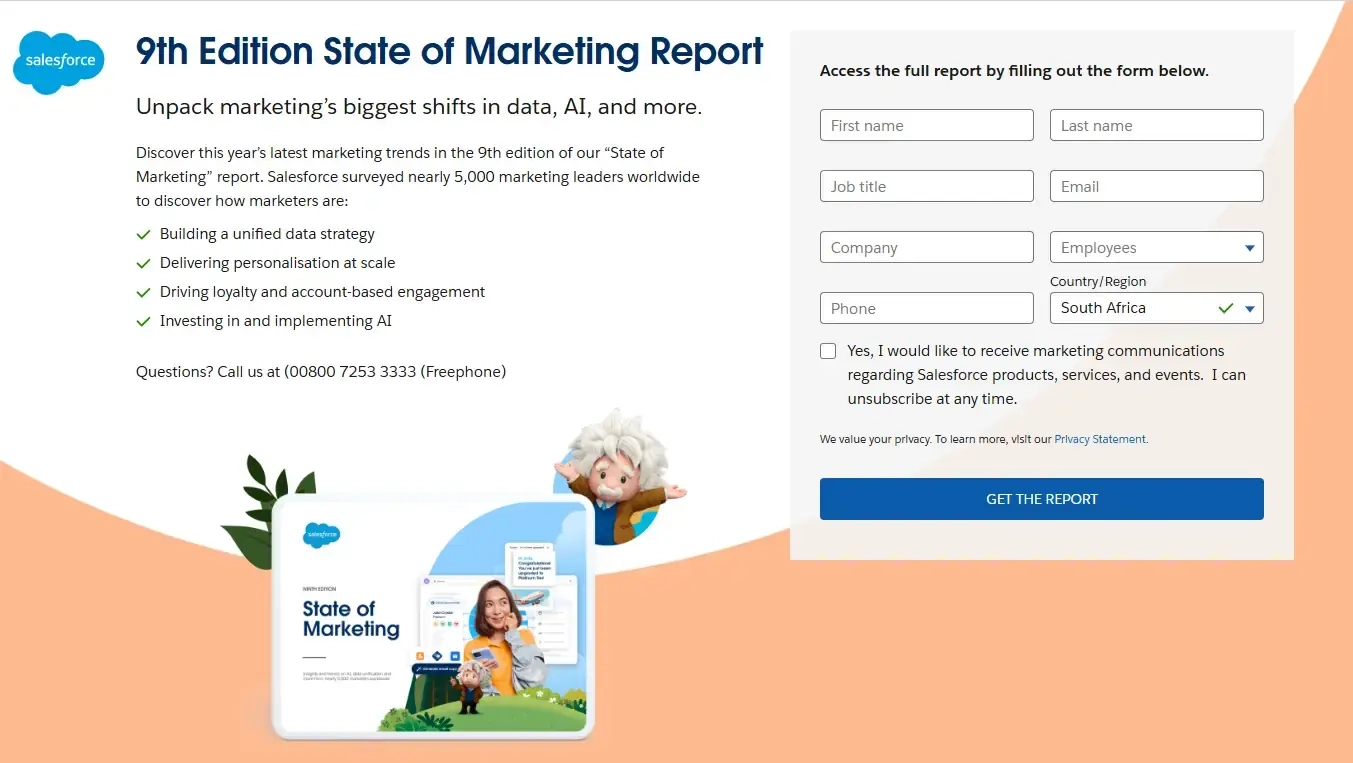
Your content should be world-class; you can’t just write a blog post. You’ll need to write a very informative post that’s better than anything else out there on the topic. If it isn’t, website owners are likely to link to competing sites over yours.
The ideal scenario is that people will find your content naturally in search results pages and link to it in their articles.
Unfortunately, this isn’t usually the case, especially if you don’t have much traffic in the first place. In this instance, you may have to promote your content via outreach.
👉 Tips for creating world-class content
Use the SkyScraper technique. Analyze your competitors’ content and produce a piece that is more updated, better, and more comprehensive than theirs.
Back up any statements you make with real statistics from studies and reports.
Add something unique. Original insight from an expert in your company adds value to your content, as these are nuggets of information that wouldn’t be found elsewhere online.
Include strong calls to action (CTAs) in your content that drive readers to take action.
Invest in proofreading and editing services to ensure your content is error-free. Spelling and grammatical errors immediately lower the credibility of your writing.
✅ Reach out to website owners
Once you have created great, linkable content, it’s time to reach out to others in your niche and ask them to link to it. Contact other websites and tell them about your site and content.
Below, we highlight the ways you can realistically earn links through outreach:
You can find the ideal websites to contact, known as target sites, with Ahrefs. Enter your website, or that of another in your niche, into the “Site Explorer” and then click on “organic competitors.” This will bring up a list of similar sites.
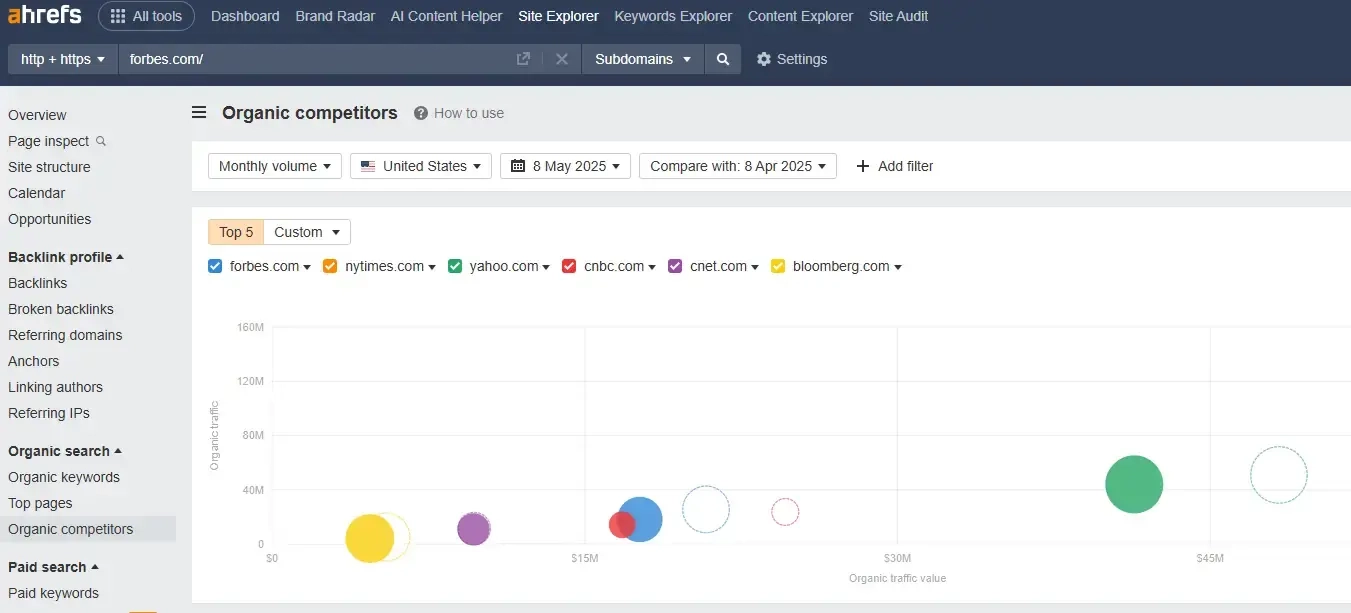
Then, it’s a case of finding out who runs the website, sending them a message or email introducing yourself, and asking them to link to your content.
Keep in mind that you aren’t the only site performing this kind of outreach. Many webmasters are inundated with outreach requests, so try to make your message stand out by offering something in return.
For example, you can offer to share one of their posts on your email list or with your social following.
👉 Tips for effective outreach
Personalize every message: Avoid generic templates. Instead, reference the recipient’s name, a recent article they published, or something specific about their site. This shows you’ve done your homework and makes your email more likely to be read.
Keep it short and clear: Website owners are busy. Ensure your outreach email gets to the point quickly by mentioning who you are, why you’re reaching out, and what you want them to do. Avoid long paragraphs or excessive detail.
Explain the value: Highlight why your content is worth linking to. Is it more up-to-date than what they’re currently linking to? Does it offer unique insights, original data, or a comprehensive guide? Make the benefits obvious in your email.
Offer a value exchange: As mentioned earlier, offering something in return increases your chances of success. This could be sharing their content on social media, mentioning them in a future blog post, or linking to one of their articles.
Follow up: If you don’t hear back after a few days, send a polite follow-up. Sometimes, emails get missed, and a nudge can help. However, you should ensure you’re not coming across as too pushy.
Use tools to scale your outreach: Consider using outreach tools like Hunter.io, Respona, or BuzzStream to find contact information and manage your outreach campaigns. These tools can help you send personalized messages at scale while tracking responses.
✅ Pursue unlinked mentions
Finding unlinked mentions involves looking for instances where a website has mentioned your business but has not added a link to your site.
In this article published by Forbes, the brand Mercedes has been mentioned several times. However, the article doesn’t include any links to the Mercedes website or any of its models. This is an unlinked mention and would be the perfect opportunity for the brand to reach out to the publication to request a backlink:


Get in touch with the people running the publication and ask them to link to you. The owner will often be happy to do so.
While it sounds like a lot of work, much of the process can be automated. Simply set up a Google Alert for your brand’s name. When you receive an email or notification, head to the web page to see if it is linked to you. If it hasn’t, send them an email asking for the link.
This strategy works best for established sites. If people don’t already know about your website, they are unlikely to mention you in the first place.
👉 How to set up Google Alerts
Below is a guide on how to set up Google Alerts to spot unlinked mentions:
1. Visit https://www.google.com/alerts and enter your brand name in the search bar. Use quotation marks for exact matching.

2. Click “Show options” to see customization settings for your alert. Here, you can adjust how frequently you want to receive notifications, sources, language, and the types of results you want to filter out spammy or irrelevant mentions.
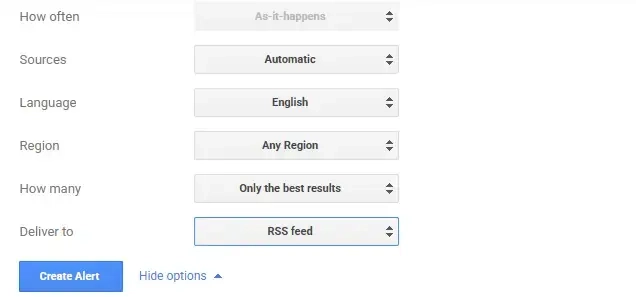
3. Click “Create Alert”. You’ll now get notified whenever Google finds a new page that mentions your brand.
👉 Tips for unlinked mentions
Prioritize high-authority or niche-relevant mentions: Not all unlinked mentions are worth pursuing. Focus on websites relevant to your industry or have high domain authority, as these links carry more SEO value and are more likely to boost your site’s DA.
Look beyond your brand name: Track mentions of key people at your company, your products or services, and even unique phrases associated with your brand. These also present valuable linking opportunities.
Time your outreach carefully: If you spot a recent mention, reach out while the content is still fresh. The sooner you contact the site owner or editor, the more likely they are to update the content with your link.
✅ Fix Broken Links
Broken link building is a strategy where you find broken links on other websites and offer your content as a replacement.
Ahrefs conducted a study of over two million websites, and they found that over 66% of the links pointing to them were lost within a year.
To fix broken links:
First, identify relevant websites that fit your industry with broken links.
Once you’ve identified a broken link, check whether you have content that might work as a replacement or create suitable content.
Then, contact the website owner, inform them about the broken link, and suggest your content as a replacement.
This strategy is mutually beneficial: website owners appreciate the help in maintaining their site’s quality, and you gain a valuable backlink.
👉 Tips for fixing broken links effectively
Prioritize high-value pages: Not all broken links are equally valuable. Focus on pages with high domain authority, strong traffic, or topical relevance to your content.
Check the original broken content: Use Wayback Machine to view the original version of the dead link. This helps you understand what the linked page used to offer so you can better match or improve on that content when suggesting your replacement.
✅ Consider Niche Edits And Paid Links
Niche edits are when you ask a website owner to link your article to their existing content. When it works, it’s an easy way to get links to specific content on relevant sites.
A study by Gotch SEO Academy found that 70% of URLs that were part of a niche edit campaign saw keyword ranking and organic traffic growth.
The downside is that if a website owner agrees to do this, they will often ask you to pay for the link.
While paying for links is technically against Google’s Search Essentials (formerly Google Webmaster Guidelines), it is common practice in many niches. It can be tough to see any progress without purchasing links.
Check out our guide on niche edits to learn how to use this strategy correctly.
👉 Tips for successful niche edits
Target aged content with steady traffic: When requesting a niche edit, look for content that is already ranking well or has built up authority over time. These pages pass more link equity and are less likely to be removed or deindexed.
Make your content relevant to the page: Ensure the content you’re linking to adds value to the existing article. If it doesn’t fit naturally, Google may remove or flag the link.
Negotiate smartly: If a site owner asks for payment, ensure the price reflects the site’s authority, traffic, and relevance. Don’t overpay for links from sites with poor metrics or no real audience.
✅ Create an Internal Linking Strategy
While backlinks are important for improving domain authority and search rankings, having a solid internal link structure in your website content is also essential.
An internal linking structure involves inserting links to other parts of your website within your content to drive conversions and sales. This forms part of your on-page SEO.
The benefits of having internal links include:
Passing link juice from one page to another.
Keeping your readers engaged.
Creating a user journey from wherever users land on your website.
Helping Google crawl and index your pages.
👉 Tips for smarter internal linking
Use descriptive anchor text: Choose anchor text, the clickable hyperlinks within website content, that clearly describes the page you’re linking to. Avoid vague terms like “click here”. Instead, use keywords or phrases that help users and search engines understand what to expect from the destination page.
Link to deep pages, not just your homepage: Many sites overlink to their homepage or contact page. Instead, focus on linking to deeper, high-value content like blog posts, service pages, or product categories that benefit most from increased visibility.
Don’t overdo it: While internal linking is a great strategy, adding too many links to one piece of content can confuse readers and dilute SEO value. Aim for a natural flow, with two to five internal links per 1,000 words as a general guideline.
Keep links updated: Regularly audit your content to check for outdated or broken internal links. As your site grows, some URLs may change, and keeping internal links accurate improves both user experience and crawlability.
✅ Optimize On-page and Technical SEO
It’s worth noting that domain authority is based on various technical and on-page SEO aspects. For example, site speed, which is how long your website takes to load, impacts your domain authority score.
Working on technical SEO aspects, like improving your site’s speed and performance, may improve your domain authority. Better yet, it may also improve how long users stay on your site.
Even a one-second delay in loading speed can lose up to 11% of website views. Customer satisfaction also decreases by 16% if your website loads slowly.
👉 Tips for strong on-page and technical SEO
Use keyword-rich, compelling title tags: Your title tag is one of the most important on-page SEO elements. Include your target keyword near the beginning and make it engaging enough to encourage clicks in search results.
Write descriptive meta descriptions: While meta descriptions don’t directly influence rankings, they can boost click-through rates (CTR). Write concise, relevant descriptions that summarize the page and include your keywords naturally.
Optimize images with alt text: Add descriptive, keyword-relevant alt text to images. This improves accessibility and gives Google more context about your page.
Keep URLs short and clean: Use simple, readable URLs that reflect the page topic. For example, yourdomain.com/seo-tips is better than yourdomain.com/123-page?id=98765.
Use schema markup where appropriate: Adding schema, also known as structured data, can enhance your search listing with rich snippets like star ratings, FAQs, or product details, improving CTR and visibility.
✅ Try HARO
HARO (Help a Reporter Out) is a link-building goldmine.
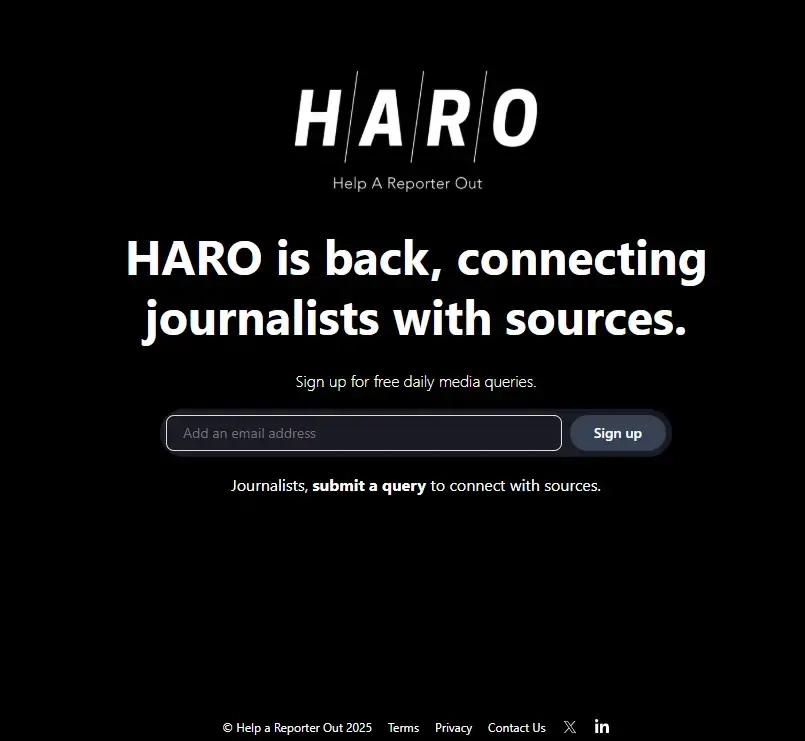
It’s not only one of the best ways to get quality backlinks from high-authority websites, but it’s also one of the most effective ways to get links in general.
The service is a set of daily email newsletters that contain requests from journalists for expert input into their stories. If you’re an expert in a particular niche, answering the request can attract a backlink.
Here’s how it works:
Head to the HARO website and sign up.
HARO presents you with a list of journalist queries.
Search for requests that you can provide an authoritative answer to.
Follow the journalist’s instructions when replying to the story and include a link to your website. It can help to set up a bio and profile picture in advance that you can easily share.
The journalist will choose the answers they like for their story.
When the story goes live, you’ll get a backlink.
👉 A tip on using HARO
While HARO is easy to use, it is also very competitive, and many people reply to each request.
To increase your chances of being chosen, you should reply quickly and in a way that makes it easy for the journalist to use your quote. Try to keep your answer concise unless specifically asked for more detail.
Take a look at our guide for using HARO to build links for more insight into this strategy.
✅ Guest Posting on High Authority Sites
Guest posting is a strategy that has been around for years. One survey found that 47% of SEO professionals use guest posting as their go-to link-building strategy. If you follow some best practices, it’s an effective way to get links from high-DA sites.
First, avoid spammy sites that would accept any guest blog post in exchange for a fee. Instead, look for quality sites with a high DA, an engaged audience, and real traffic.
Sometimes such sites will have a “Write for Us” or “Contribute” section on their website, but they often won’t.
You then need to pitch quality articles that genuinely add value for the website’s readers.
Below is an example of a guest post. The author has written a post for a high-authority blog, and that includes a link to her business’s website in the copy of the article:

Here are two examples of high-DA sites that accept quality articles.
➡️ HubSpot
HubSpot, a site with a domain authority score of 92, publishes guest posts for its marketing, sales, service, and website blogs. The company knows that getting input from experts in the field is an excellent way to generate interesting posts for its target audience.
But the site has very high requirements for the type of posts it allows on its blog. Its marketing blog has a long list of requirements. These state that it typically only accepts:
Original experiment or analysis posts.
Canonical posts that go into great depth on a particular topic.
Graphic posts.
Creating this type of content isn’t easy. But if you can meet these editorial standards, you will get a valuable and authoritative link from a DA 92 site—we've managed it before.
➡️ Entrepreneur
Entrepreneur is a DA 92 site that accepts guest submissions in its Entrepreneur Leadership Network section. Like HubSpot, stringent editorial standards apply to the type of articles it will publish.
You can find out more about their publishing guidelines on their website. Articles you submit to this website should:
Offer a fresh approach to the subject you want to cover.
Focus on a narrow area or niche.
Be practical and instructive.
Not be overly promotional of your business.
➡️ Finding guest posting opportunities
HubSpot and Entrepreneur are suitable for guest posts in the business or marketing niche. You’d need to write an article on these topics. Otherwise, it won’t be accepted.
When looking for opportunities, think about the top publications that cover your industry and research whether they accept submissions.
Then think about story ideas that will resonate with the site’s audience and pitch them to the publication. If there are no specific guest post instructions, consider contacting the website editor or owner.
👉 Tips for crafting an epic guest post
Be informative and educational. Spend some time doing in-depth research so that you can provide the reader with valuable insights.
Data-led content is extremely popular and typically performs well. Including some interesting statistics or mentioning your own studies should grab the reader’s attention.
Keep the website’s audience in mind. You want to create content that will resonate closely with the site’s readership, as this will make them more likely to take action and potentially visit your backlink.
Follow the format of the website’s posts. The site owner might be explicit about formatting the guest post you submit. If not, take time to look at their live guest posts and be sure to format the blog post you submit accordingly.
✅ Target Sites With Decent Traffic
Moz’s DA score considers whether the links come from legitimate sites with real traffic. If they don’t, the algorithm will likely discount them.
There are several easy ways to check whether or not a site is legitimate.
First, use an SEO tool like Ahrefs, Moz, or Ubersuggest to determine whether a site has real search engine traffic.
These tools show approximately how much traffic a website gets each month. At LinkBuilder, we target sites that attract at least 1,000 organic visitors monthly.
As you can see below, this site has some steady traffic that is gradually increasing. They also have a domain rating of 79, which has improved by 15 in the last few months. This would be a site worth targeting:
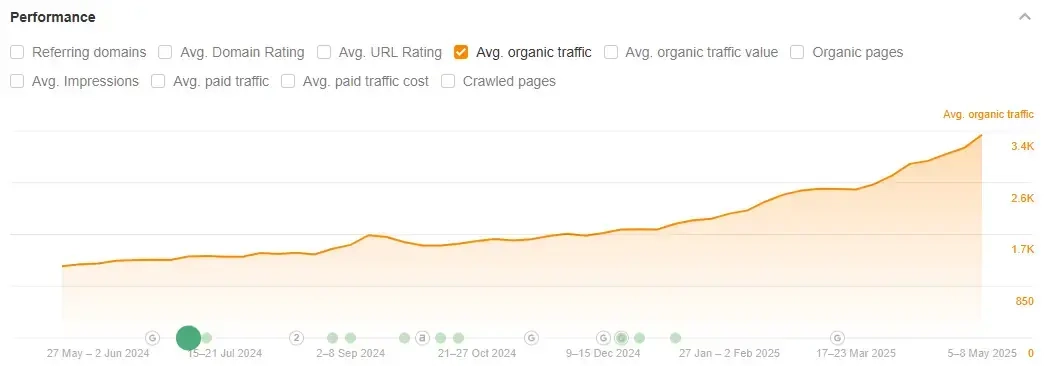
Sometimes, a site in a downward spiral will still have some traffic, so look out for the general direction the traffic is heading in. If it recently had a sudden drop, it may have suffered a Google penalty, which can be a sign of a low-value site.
Also, look for the types of keywords a site ranks for. A spammy site may still get traffic from low-value keywords.
You can also check a site’s social media accounts to estimate whether it receives traffic from these channels. Look for active accounts with posts people comment on, like, or share.
The final quality check is simply looking at the website itself. Spammy sites will typically have several signs that suggest that they are low-quality. These include:
Articles on a large number of seemingly unrelated topics. These often include posts about casinos or gambling.
Posts that are short or poorly written.
Many articles are written by a “Guest Author” or users with similar titles, but the site itself creates little original content.
Articles that include unnaturally placed or spammy backlinks.
✅ Consider Growing Websites
Gaining links from sites that are in their early stages, but showing growth can be beneficial. If you get the chance to receive a link from a site that appears to be new, then it could be worth targeting them.
Use a tool like Ahrefs to see how a website’s backlink profile is growing over time. If the site shows a growing trend, it could be a sign that it will continue doing so in the future.
✅ Prioritize backlinks from sites that don’t link out much
Ahrefs considers the number of sites a domain links to when calculating DR. So, links from publications that don’t link out much are more valuable than those from sites with similar authority that link to many other domains.
You can use Ahrefs to see how many domains a site links to. Click on “Outgoing Links” and then “Linked Domains.” This will show you how many different domains a website links to.
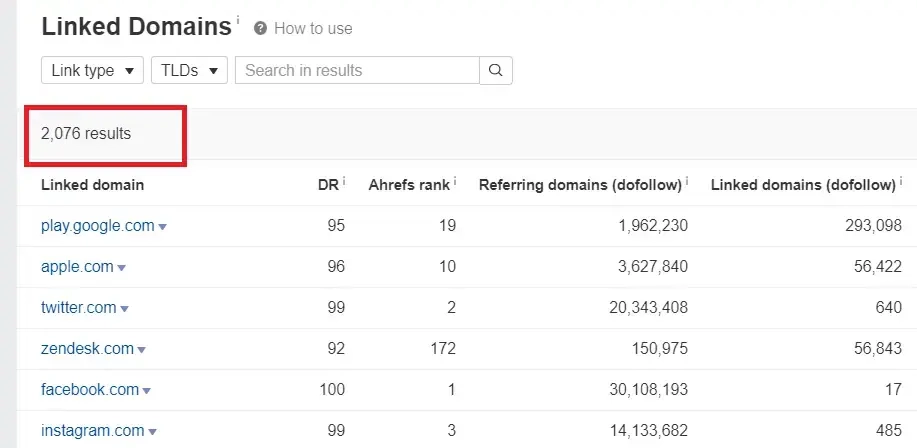
✅ Get listed in online directories
Getting listed on reputable directories is a simple but effective way to increase your domain authority, especially if you’re a local business.
Directory backlinks are trust signals that tell search engines like Google that you’re a legitimate business, which could contribute to your website’s authority.
These links are typically easy to acquire and are considered legitimate by search engines, making them a low-risk way to build backlinks.
For businesses targeting a specific area, directory listings are also a critical part of local SEO.
What Is Local SEO?
Local SEO involves optimizing your website and online presence to increase your visibility in local search results.
It helps businesses appear in searches for nearby services, making it especially important for companies that serve a specific geographic area.
Being listed on platforms like Google Business Profile, Yelp, Bing Places, and local chamber of commerce websites helps your business appear in local search results, maps, and “near me” queries.
Below is an example of a business that has a listing on Yelp, earning them a high-quality backlink to their site and potentially helping them appear in local search results:
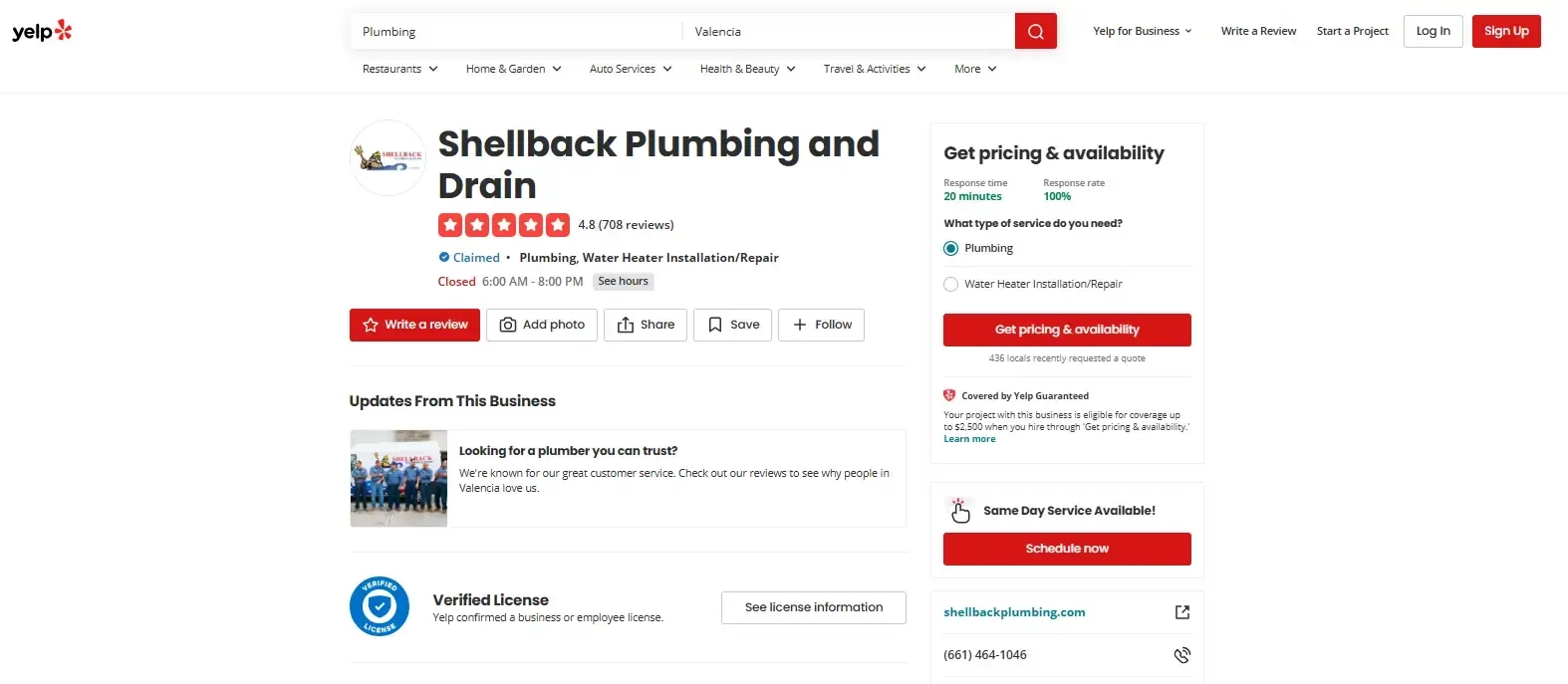
Source
👉 Tips to get the most out of directory listings
Ensure NAP consistency: Your business name, address, and phone number (NAP) should be consistent across all platforms. Inconsistent information can harm your local SEO.
Choose high-quality, relevant directories: Focus on directories with strong reputations, real editorial oversight, and relevance to your industry or location.
Fill out your profiles completely: Add a description, website link, business hours, and images where possible to increase credibility and engagement.
How to Check Domain Authority?
There are several free SEO tools you can use to check your domain authority. These include Website SEO Checker, SEO Review Tools, and SmallSEOTools.
Simply enter the website's URL, and the tool will show you the domain’s authority score alongside other useful information.
A useful option to check domain authority is the Moz Bar Google Chrome plugin. It provides real-time domain metrics as you browse the web.
The tool is free to use, although you’ll need to sign up for a Moz account first.
With the Moz Bar, you can:
See the website's domain authority score. Ensure the tool is active and you’re logged in to your Moz account.
See the site’s domain authority, page authority (PA), and the number of links each page has in the Google search results. This is an easy way to gauge how difficult it will be to rank for relevant keywords.
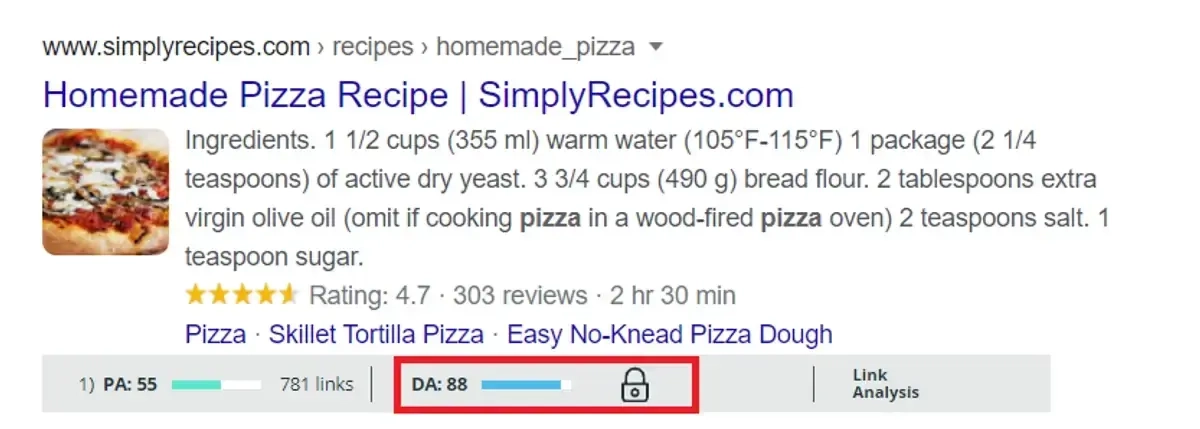
Another option is to use Ubersuggest to search for a site’s domain authority. Just head to the tool’s home page, then search for the site you want to learn more about.
It shows you the Moz domain authority score alongside useful information like traffic and the top keywords a site ranks for.
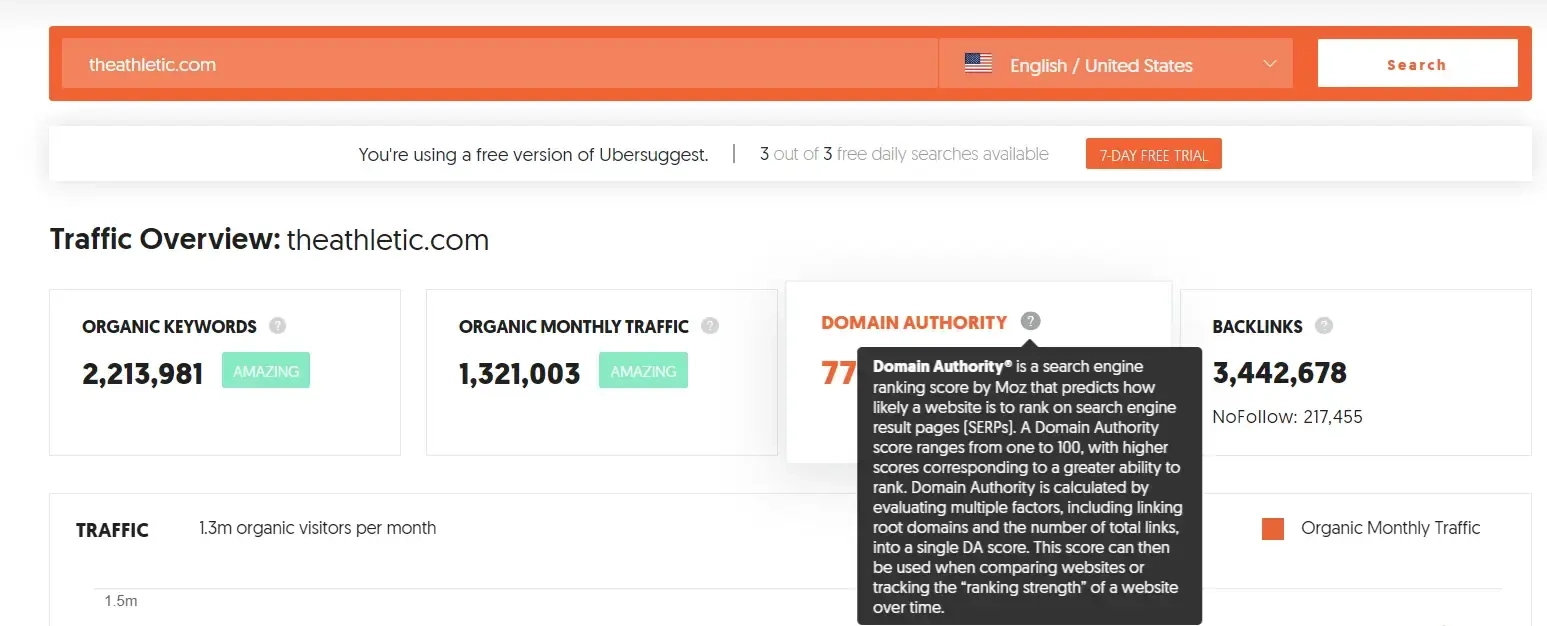
If you want to know the Ahrefs domain ranking of a site, you can find this easily, even if you don’t have a subscription.
You can carry out unlimited searches by heading to the authority checker on their website and entering the URL of the site you want to search for.
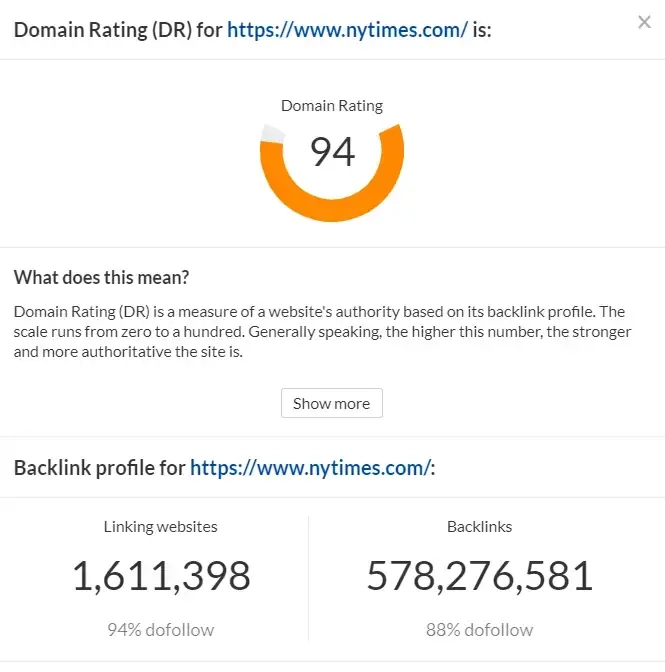
Why You Should Consider Your Domain Authority
People commonly use domain authority to measure the success of their off-page SEO and link-building efforts.
People think that if they are increasing their website authority score, their strategy must be working.
In many cases, this is true. If your site is new or has a lower domain authority, you will likely see results fairly quickly as you build backlinks and achieve a good domain authority score.
But, as your domain authority score increases, so does the number and quality of the links you need to attract to see improvements. This means you could build many links, but not see much improvement.
Another issue is that the scores are relative to other websites, so you can end up in a situation where your DA or DR goes down despite having more links. This happens when other sites build links faster than you do.
So you shouldn’t rely solely on DA to measure whether your search engine optimization efforts are working. Be sure to keep an eye on multiple metrics.
🚀 Want high authority backlinks on autopilot?
👀 Other metrics to keep an eye on
The number of links that point to your site.
The number of referring domains.
Your inbound traffic.
Your Moz Spam Score.
Your ranking for individual keywords.
Your average ranking.
How many broken links you have.
Website owners also use domain authority when deciding which relevant keywords to target.
If the sites that rank for a particular term have high domain authority scores, it may be difficult to compete with them in the SERPs. But if your website has a similar or higher domain authority to those already on the SERPs, you have a good chance of ranking with an optimized piece of content.
Of course, having a good domain authority score is just a guide. Many other factors influence whether a piece of content will rank well on Google. Some other questions to ask include:
Does your content match searcher intent?
Is it optimized for its target keywords?
Do you have internal links pointing to it?
Have you built external links to the page?
Is the length of the content similar to other pages in the SERPs?
How is Domain Authority Calculated?
Ahrefs’ DR score is similar to Moz’s domain authority. It is also a logarithmic score out of 100, and its relevance to other sites in the database is also considered.Ahrefs provides more details about the factors it considers in its calculations. These are the top three influencing factors:
The number of websites that link to your domain. Nofollow links, which don’t impact search rankings, are discounted.
The DR of the sites that link to your website. A high-DR website link will typically have more impact than links from low-quality sites.
The number of sites a domain links to. A link from a site that rarely links to other domains is worth more than one from a site with links pointing to many domains.
Beyond these three factors, Ahrefs also says that:
You will only see a DR boost the first time a site links to you. Multiple links from a single domain will have the same impact as a single link.
If a site’s DR increases after linking to you, the improvement will be reflected in your domain score.
Is a Low Domain Authority Score Bad?
Having a low domain authority isn’t necessarily a bad thing, and it doesn’t mean you won’t rank on Google.
No website starts with high page authority or a good DR score, it needs to build backlinks first. The only exception is when a site is built on an existing domain that already has links pointing to it.
There are plenty of low domain authority sites that rank for low-competition keywords that bring in organic traffic. Also, if you want to rank for low-competition keywords, increasing your website’s domain authority might not be a priority.
For example, the site below has a DR of just 1.9, yet it receives thousands of visitors every month, according to Ahrefs.
There are also plenty of examples of high domain authority sites that are low-quality or spammy.
Websites built on expired domains or those that have landed themselves a Google penalty can have high domain scores while being low-quality and having little organic traffic.
⚠️ What Is a Google Penalty?
Also known as a manual action, a Google penalty is when a human reviews your website and finds that you are breaking its guidelines.
A Google penalty can result in your website being removed from the SERPs entirely, and you may see a significant crash in your traffic.
Recovering from a Google penalty is difficult, so our advice is to do everything you can to avoid being penalized.
Read our full guide on Google penalties to learn how to avoid a manual action against your website.
When assessing the quality of a website, you should consider several other factors in addition to domain authority, including:
How the site ranks on Google.
How much organic SEO traffic it receives.
Whether or not it has a unique design, versus a generic templated layout.
If it publishes high quality content.
Domain Authority vs. Page Authority (PA)
Page authority (PA) is a similar metric to domain authority. But instead of ranking the site as a whole, it looks at a single page.
Improving the page authority of an article compared to its competitors can help low domain authority sites outrank competitors.
In fact, Ahrefs found that the number of links pointing to a page was a better indicator of whether a page would rank on Google than DR. Links pointing to a page are a factor Moz uses when considering PA.
As you build your page authority, your domain authority will also typically increase.
How Many Links Do I Need to Increase Domain Authority?
There is no definite answer to this question, as both Ahrefs and Moz use more than just the number of linking domains to calculate their website authority rankings.
🔗 Calculating how many links you need
💡 The average website with a DR of between six and 10 has around 30 referring domains (RDs).
💡 The average domain with a DR of between 11 and 15 has 44 RDs.
This suggests you need to attract links from around 14 more domains to move into the next bracket.
💡 The average site with a DR of between 41 and 45 has 263 RDs.
This is compared to sites with a DR of between 46 and 50, which have 352 RDs—an increase of 89.
💡 At the top end of the scale, the difference in RDs between a site with a DR of 91-95 and one with a DR of 96 to 100 is over eight million.
This suggests that as you improve your website authority, the number of RDs you need increases significantly.
Don’t Get Too Caught Up with Domain Authority
As mentioned above, domain authority is relative, and your score may decrease even after improving your link profile if other sites have built links faster.
But remember that DA considers all websites, not just those in your niche. If you have improved your backlink profile faster than your direct competitors, you may find that you still have a DA advantage, even if your overall domain authority score has decreased.
In fact, you can run an excellent link-building campaign but still not see much improvement in these metrics due to external factors.
Wrapping Up on How to Increase Domain Authority
If you want to increase your website’s DA, you must engage in link-building activities. But these can be difficult to do yourself.
If you don’t have the time or expertise to implement your own campaigns, consider hiring experts like LinkBuilder to do the job. We specialize in building high-quality links at scale for businesses in various niches.
Contact us today to find out how we can help you acquire powerful links that drive real authority!

